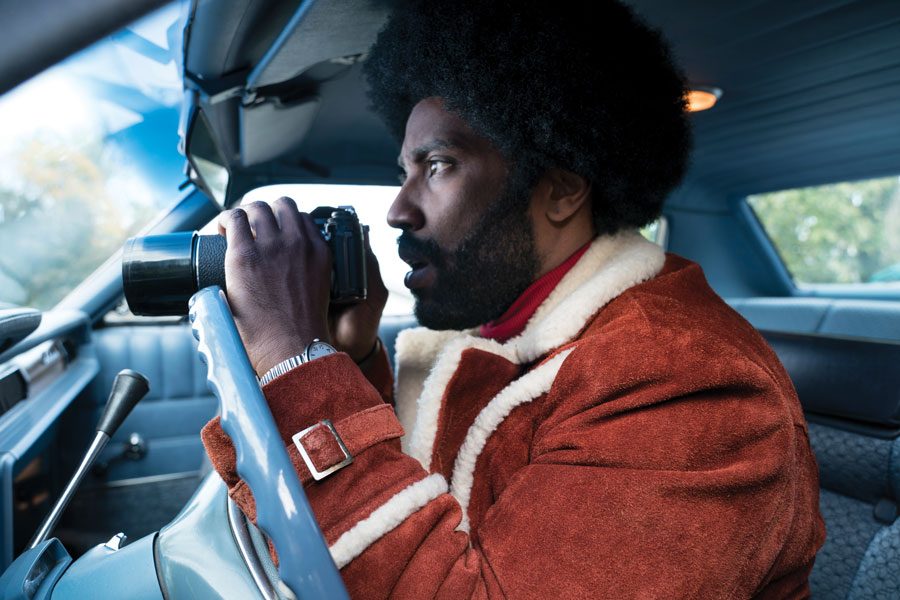Spike Lee infiltrates patriotic epics with a bold, unapologetic approach
Source: David Lee/Focus Features
John David Washington stars as Ron Stallworth in Spike Lee’s “BlacKkKlansman.”
February 14, 2019
“BlacKkKlansman” begins with a coup de grâce.
We hear a staccato drum cadence over the opening credits, the sort that invokes “Apollo 13”; “Forrest Gump”; the entirety of Michael Bay’s oeuvre.
Then, in 4:3 ratio, a woman appears in the lavender dress, the southern belle navigating rows of writhing and moaning soldiers lying in red dirt. Horns play, reverent, dignified, with the tinkling of piano and the thrum of strings following in an orchestral crescendo.
The camera pulls up and away, a gonzo tracking shot that shows off more and more twisting bodies as we hear the woman cry, “God save the Confederacy!”
And then, battered but proud, crimson and navy on the Technicolor film stock, the Stars and Bars pull into focus, resolute in the wind.
It’s a moment so laden with melodrama that one could mistake the salacious imagery for parody – and given this is the rarely subdued director Spike Lee, that wouldn’t be a bad guess. He even employed a similar technique in his 1986 feature debut “She’s Gotta Have It,” setting a moment of satirical fantasy apart from the otherwise black-and-white aesthetic with striking Popsicle coloring.
But herein lies the masterstroke: The scene is no parody or deconstruction. It’s “Gone with the Wind,” the cinematic masterpiece, still the highest-grossing film ever made when adjusted for inflation. It is a great movie, arguably the greatest, and Lee rips it from its pedestal in 55 seconds flat.
“BlacKkKlansman” is Lee’s rebuttal to the Great White Epic; to “Gone with the Wind”; to “The Birth of a Nation,” the technically revolutionary racist fable that features heavily throughout “BlacKkKlansman”; and to every overwrought tale of American jingoism since.
Not that it doesn’t, at least for a while, indulge in the genre’s trappings. The set-up is certainly worthy of the shinIer, more woke historical dramas of recent memory: Lee tells the story of Ron Stallworth (John David Washington), a Colorado Springs policeman who infiltrated the Ku Klux Klan in the 1970s.
The dynamic of the police operation, with a white, Jewish cop (Adam Driver) impersonating “Ron Stallworth” to the Klansmen’s faces while the real Ron talks to them on the phone, is grade-A dramatic potential, with dashes of a good buddy cop story.
But Lee doesn’t quite buy into his own tale, and his refusal to engage in the status quo is immediate. An early scene at a Black Power rally that would be handled by most directors with detached objectivity becomes a moment of almost surreal empathy, with the faces of enraptured attendees emerging from a darkened screen. By contrast, Lee rushes through what would be a nail-biting standoff between Driver’s cop and a frothing-at-the-mouth Klansman demanding “Stallworth” take a lie detector test.
This contrarian approach carries throughout the film. The real Stallworth, embodying that well-worn notion of changing the system from the inside, faces far more scrutiny though Lee’s lens than we’re accustomed, and an ambiguous climax makes nobody look great.
That’s probably because Lee is more interested as a filmmaker in commenting on our modern circumstances than telling a feel-good story. As stated, Lee is not known for subtlety, and some of his louder moments feel almost cartoonish: a scene where Stallworth’s (white) sergeant explains to the officer how a Klansman could twist coded language into a path to the presidency is obnoxiously on-the-nose (and equally baffling given the film is set during the “law and order” presidency of Richard Nixon).
Far more effective is the chilling presentability of the Colorado Springs’ Klan president as well as the national director of the rebranded “Organization,” the real-life David Duke (Topher Grace). Lee dedicates significant screen time to split-screen phone calls between Stallworth and Duke, shot at Dutch angles meant to emphasize our unease even when the film overtly mocks Duke.
After that opening clip, we don’t hear the orchestra of “Gone with the Wind” again, though those staccato drums occasionally reappear. Instead, there’s the resigned electric guitar lick of composer Terence Blanchard, who has scored every Lee film since 1991.
The music nominally fits with the crime drama unfolding on screen, but the film doesn’t really care about that drama, and neither does the score. It doesn’t quicken with the action or rise in a moment of victory. It’s slow, mournful, plodding. It almost doesn’t fit.
Until the very end.
In a moment of cinematic boldness, Blanchard’s score sheds the electric guitar, Lee sheds his story, and we are subjected to a sustained moment of pure, unbridled sensation. It is Lee’s voice, unadulterated. It is rapture, and it is horror.
And it is “BlacKkKlansman.”
God save the Union.
Email: joshuairvine2022@u.northwestern.edu
Twitter: @maybejoshirvine


